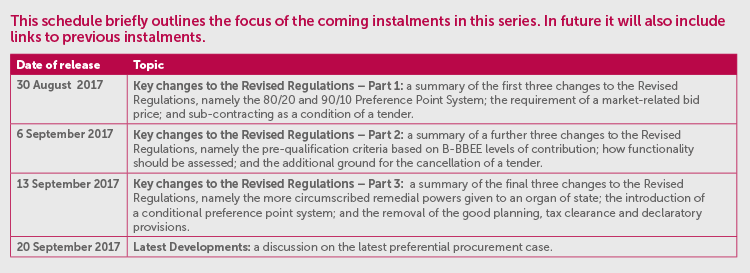Changes to Preferential Procurement Law in South Africa
An examination of these changes is necessitated by the fact that government procurement in South Africa is of huge significance. The procurement of goods, services and works in the public sector will amount to R1.5 trillion over the next three years across all spheres of government. Aside from those instances where government uses private entities for the provision of goods and services for their own purposes, in recent years government has increasingly been making use of private entities for the provision of goods and services to the South African public on their behalf.
The importance of government procurement in South Africa is further illustrated by the fact that it has been afforded constitutional status in s217 of the Constitution. In terms of that section, in the event that government chooses to contract for goods and services, it must do so in accordance with a system which is “fair, equitable, transparent, competitive and cost-effective”. These five principles apply to the mechanisms and procedures employed by the government when it contracts for goods and services.
The Constitution also provides for the use of procurement as a means to address past discriminatory practices. In light of this objective, s217 stipulates that organs of state are not prevented from implementing a procurement policy providing for, among other things, categories of preference in the allocation of contracts; and the protection or advancement of persons or categories of persons, disadvantaged by unfair discrimination.
It was therefore essential for national legislation to prescribe a framework for the implementation of a preferential procurement policy, most importantly in respect of tender awards. Therefore, the legislature enacted the PPPFA, which provides that the Minister of Finance may make regulations in order to give effect to the objects of the PPPFA. The PPPFA provides a framework in which organs of state must implement their preferential procurement policies, which will state that a preferential point system must be followed. In order to give effect to its aims, s2(1)(d) of the PPPFA provides that certain points will be allocated to tenderers who were historically disadvantaged by unfair discrimination on the basis of race, gender or disability.
In order to give effect to the new policy role of government procurement in South Africa, the institutional and regulatory framework for public procurement has undergone a number of changes. The latest in this suite of changes are the new Revised Regulations which were promulgated on 20 January 2017 and came into effect on 1 April 2017. This is the second revision since PPPFA regulations were first promulgated in 2001.
The Revised Regulations propose a number of changes which will be discussed in this alert series. In essence, the Revised Regulations were promulgated with the aim to use public procurement as a catalyst to promote radical socio-economic transformation; the empowerment of small enterprises, rural township enterprises and designated groups; and the promotion of local industrial development. In particular, and for reasons that will be elaborated upon later in this series, businesses that rely heavily on government tenders for their profits should pay careful attention to the Revised Regulations.

The information and material published on this website is provided for general purposes only and does not constitute legal advice. We make every effort to ensure that the content is updated regularly and to offer the most current and accurate information. Please consult one of our lawyers on any specific legal problem or matter. We accept no responsibility for any loss or damage, whether direct or consequential, which may arise from reliance on the information contained in these pages. Please refer to our full terms and conditions. Copyright © 2025 Cliffe Dekker Hofmeyr. All rights reserved. For permission to reproduce an article or publication, please contact us cliffedekkerhofmeyr@cdhlegal.com.
Subscribe
We support our clients’ strategic and operational needs by offering innovative, integrated and high quality thought leadership. To stay up to date on the latest legal developments that may potentially impact your business, subscribe to our alerts, seminar and webinar invitations.
Subscribe




